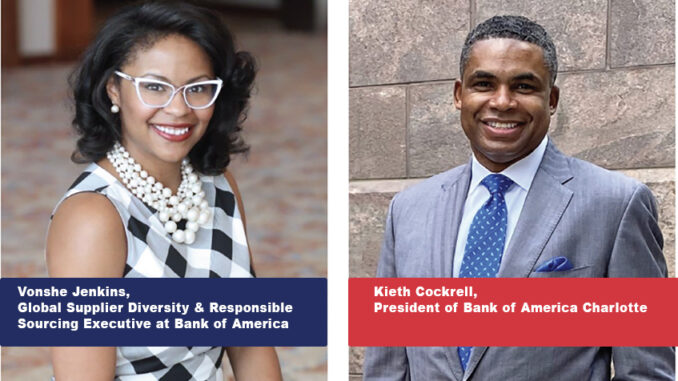
As our community slowly begins to emerge from the pandemic, we know that small and diverse businesses are experiencing a slower economic recovery. Pride Magazine interviewed Kieth Cockrell, President of Bank of America Charlotte and Vonshe Jenkins, Bank of America’s Supplier Diversity and Responsible Sourcing Executive, to hear their advice on how diverse companies can build their business pipeline.
Pride Magazine:Kieth and Vonshe – welcome! Thanks for sharing your perspective. We’ll start with Kieth. Since you’ve taken on Bank of America’s leadership for the Charlotte market, what are you seeing and hearing in the community?
Kieth: Charlotte’s resilience, vibrancy and commitment to making our city a better place has always inspired me. Even during a pandemic, we overwhelmingly passed a nearly $200 million bond referendum in 2020. I see and hear that same energy from business and non-profit leaders.
But we know there’s still work to do. We funded a recent study from the UNC Charlotte Urban Institute on minority-owned small businesses, which make up 37% of Charlotte businesses. That reaffirmed there’s a lack of trust in larger banks. We’re leaning into that gap.
We’re taking action. We’re piloting a Black-Owned Business Initiative with 15 business owners in Charlotte. We’re connecting business owners with the training, financial resources and contacts they need.
Pride Magazine:Vonshe, are large corporations really interested in working with diverse suppliers? What value do diverse suppliers add to these corporations?
Vonshe: Absolutely! We’ve worked closely with diverse vendors for over 30 years, and we spend nearly $2 billion each year with them. Why? Hands down, diverse vendors enhance our supply chain with flexibility, innovation and cost savings.
Diverse suppliers are a big part of the economic engine that drives the communities where we live, work and serve. We’re proud to hire diverse companies because when they succeed, the diverse communities we serve also experience tangible and sustained economic benefits that fuel dreams.
Pride:So, what are key attributes that corporations look for when selecting diverse suppliers?
Vonshe: We want our suppliers to be financially stable, have experience with servicing similar sized companies, have volume in production depending on the product, have a solid business model that can flex with our needs and know how to manage risks.
Certification as minority, women, disabled, veteran, LGBTQ and Hub Zone owned is important so we know we’re working with a diverse company.
Pride:How can diverse companies build or demonstrate these attributes?
Vonshe: Work with non-profits dedicated to enhancing diverse companies. The National Minority Supplier Development Council (NMSDC) and the Women’s Business Enterprise National Council (WBENC) help diverse companies develop and prepare to do business with large corporations.
Get experience. Crawl before you walk; meaning get experience on smaller or local opportunities to get a better understanding of how requests for proposals (RFP) processes work and how to fulfill contracts end-to-end.
Build a track record and reputation of outstanding performance and leverage that experience to work with larger corporations.
Pride:How can diverse companies get into corporations’ supplier diversity pipelines? And how can they network and increase their visibility?
Vonshe: Make sure your company is certified to expand your opportunities. We partner closely with certifying organizations like the NMSDC, WBENC, National LGBT Chamber of Commerce and Disability: IN. Their priority is to connect their diverse business members to their corporate members through education, matchmaking and networking events.
Many corporations have external supplier registration portals. Do your research and register! Work your personal network. Ask your friends who work for large corporations to refer you.
Also, actively create and build content with your brand on LinkedIn.
Pride: What are some tangible things Bank of America is doing to support diverse companies?
Kieth: I’m so proud of our company’s 5-year, $1.25 billion commitment to advance racial equality and economic opportunity.
In Charlotte, we’ve hosted business roundtables with Black, African American and Hispanic Latino business owners to understand how we can better serve them, and they continue to advise us.
We’re supporting workforce development and job skills training. We’re donating $1 million to Central Piedmont Community College to spur jobs and innovative pathways to employment; $150,000 to The Urban League and Center for Community Transitions; and $100,000 to Goodwill Industries, Foundation for Girls and Profound Gentlemen.
We’ve hosted 15 Better Money Habits Financial Literacy Programs in English and Spanish for business owners, their employees and the community, and have 7 more scheduled.
This year we’ll donate over $3.8 million to support affordable housing and small businesses for communities of color.
Pride: Kieth, not every company can provide support at that level. Any ideas for what others can do?
Kieth: Our goal is to inspire others to join us in driving solutions. Here’s an example: We donated 10,000 Chromebooks and volunteer hours to support Charlotte students and their families. Our long-standing partnership with the city, schools and other companies helped us quickly get them to those in need.
Our 16,000 Charlotte teammates are buying from diverse businesses through a minority business directory and competitions.
Pride:Any last words of advice?
Vonshe: Take advantage of every opportunity. As you rise, bring others with you by providing advice, connections and opportunities.
Kieth: Be a catalyst. Build a coalition to make tangible, long lasting change. Never underestimate the positive impact you can make.
